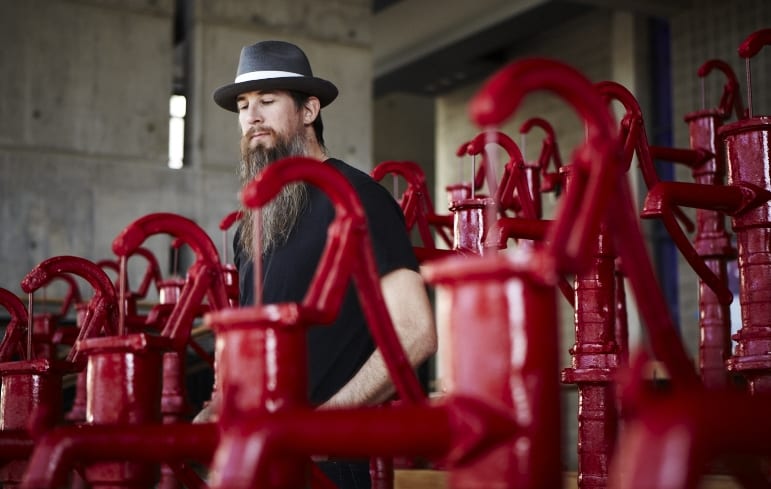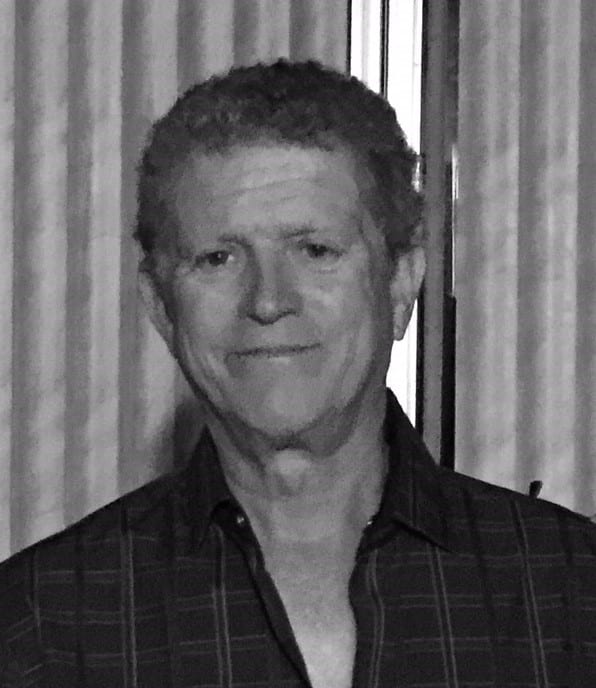Arthur Pena
Oak Cliff-based artist has directed many projects for the city of Dallas from the exhibition center WARE:WOLF:HAUS and the music venture Vice Palace.
Did you have a business plan when you started your business?
All of my works and projects are just coming from my arts, working form the anxiety of it.
I like to create new projects and I have access to resources and people as curators and gallery owners and spaces to exhibit. I pull them together to create and find new ways of expression. I came back to Dallas because my family is here, I felt a responsibility for my city and my purpose is to bring the energy I witnessed in Chicago. The WARE:WOLF:HAUS was an art space. My plan was to open a space for art shows and music to meet. When I started it was just based on an organic process. My plan was to offer and put as many things as I could out there. Vice Palace was different, I recognized that there was an opportunity to be part of it as there were not underground events at that time. What matters is that things happen. I had to put out things for my expression, for my community.
Do you think business plans are necessary for entrepreneurship?
Yes, I think business plans are definitely important for any business, but arts in particular have so many additional considerations. Aside from doing the volume of business to keep the doors open, art people maintain a program and have to always remain true to the artistic vision behind it. Sometimes these values are difficult to quantify, but it is important that all stakeholders are on the same page with regard to the mission and vision.
What three pieces of advice can you offer developing arts entrepreneurs?
A thing I learned on the way was that failure teaches so much more than success. Last year I was serving tables cause I lost my job as teacher assistant and I lost my studio. I had nothing and I had to stay at my friend’s place. I lost everything in a way. However, I came from nothing and I do not expect anything. Every time I wake up in the morning and I work in my studio I get to win. All the rest is surplus. For this reason, other advice is to show gratitude for what we create. Gratitude is important in life. If I can put together an exhibition for a friend and help him through resources I have, I am grateful. I grew up in a place where gun shooters were all around in Oak Cliff. It was my own warzone and I had two options: living with it and keep going or internalizing and finding energy to create something new. I would say that this is not even energy; it is fear in a certain way of not recognizing how beautiful this world is. Last advice is keeping up with your ideas and your vision and recognize what you need to do. It is a powerful thing when an artist or a cultural entrepreneur has a sense of responsibility to create a vision for the community. Do not be afraid of doing the show because you fear no one will show up, take photographs and publish on digital space and keep up.
Dallas-based artist and founder of the Biennial Aurora in the Dallas Arts District.
Did you have a business plan when you started your business?
The hardest part of starting a business is planning. I have been active since college and I was entrepreneurial since that moment. So, I was learning how to make things happen and act with players within the territory as donors, patrons and government. Today, I still deal with many constituencies and fundraising is the key. For that reason I started to plan a lot, as people want to make sure you are using their money wisely. But honestly, when I started I did not have a business plan. When you start sometimes you have to weigh your risk and the level of the opportunity, even though it is not really planning. The real starting is from what you care about first, before you try to figure out what is the value in it. So, first it is an internal perspective and then you push it outwards and you ask yourself what are communities you want to serve and help.
Do you think business plans are necessary for entrepreneurship?
They are not necessary, but I will strongly recommend it. Business plans help you to focus on what you are really doing and how well you are doing it.
They are challenging also. There are some people that never did it and get frustrated, so perhaps they should ask for help; for instance, students of Arts Management. In addition, being willing to talk about financials and being able to think in long term is important for anybody who wants to be entrepreneurial. So many times when you start something, you have to stop and give some research in all of those areas, get somebody to help you with sales, fundraising and marketing.
What three pieces of advice can you offer developing arts entrepreneurs?
Talk with as many people as possible about your idea. Do not be quiet, and do not be scared that someone will steal it, as nobody will do it identically to your thoughts. People will mentor you and give you advice on risk and transfer their wisdom and knowledge.
A great understanding of your job is also important. What does your gallery sell? Does it have some sort of value? You have to know how to explain the value of your business. It is not just about you, that you love the arts you are exhibiting, that everyone will love it. It is about you understanding and be capable of explaining someone else what is the value that you are doing, especially for art.
The last advice is to write down your ideas and start spreading then. Also you have to be able to spread your message to venture capitalists, donors, clients, and, therefore communication represents a key to success.
Art collector and gallery owner of the Kirk Hopper contemporary in Deep Ellum.
Did you have a business plan when you started your business?
I first started in the Design district and I had just the space. I knew I wanted to transform it in an art space, but I did not think about anything else. So then some thoughts came to me asking, “Do you maybe want someone to work there? What are resources I need?” But the thing was that I had artists ready to be showed and my offer was highly differentiated, it was an opportunity I could not let go. The first show was of six artists from San Antonio and slowly I expanded knowing other artists and buyers. I started to think about financials when I signed the lease for three months because I had to generate revenues to cover it. However, I had money and I took it form my pocket for a very long time. Then I moved in Deep Ellum area, thanks to the partner I had. I own the building so I do not have the pressure anymore to pay the rent every month and the gallery is expanding from a very local perspective to a better outreach. The big challenge was and still is, to engage regular audience outside the art world to increase streams of revenue, to continue to grow and it is really difficult to forecast.
Do you think business plans are necessary for entrepreneurship?
Talking financials is important; you have to know how much you are going to spend on something, taking all into consideration. Think about the rent, utilities, the assistant’s salary, shipping, display costs and insurance. Many galleries meet their demise because they fail to calculate how much money they will need to generate to keep doors open.
What three pieces of advice can you offer developing arts entrepreneurs?
A piece of advice to open a gallery is to get some experience before starting something on your own or take a partner with deeper knowledge. I knew a man in New York who had a gallery and wanted to open in Los Angeles so he got a partner there to open. Get a partner with experience and expertise, if you do not have enough.
Make sure you know how much it will cost and that you have enough money to do it. A lot of galleries close after two years of operation, on average, because they do not know how much it costs. And this is challenging because rental contracts are for at least three years as in the Design District.
Talk to some other galleries and competitors to see what they sell. Think in terms of artistic contribution and add something new in the arts world, displaying new artists and taking risk representing them. However, make sure that you have deep knowledge of the place where you are going to operate because you don’t want to open something that someone is already doing.
Anna Vittoria Magagna is a graduate student from Bocconi University in Milan. Magagna took Developing an Arts Venture Plan, a class in the Arts Entrepreneurship program in Meaodws School of the Arts, SMU.






